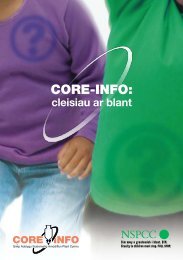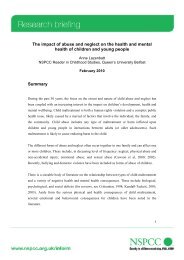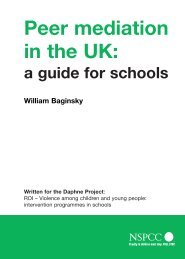Neglect and serious case reviews (PDF, 735KB) - nspcc
Neglect and serious case reviews (PDF, 735KB) - nspcc
Neglect and serious case reviews (PDF, 735KB) - nspcc
You also want an ePaper? Increase the reach of your titles
YUMPU automatically turns print PDFs into web optimized ePapers that Google loves.
parental learning disability<br />
Parental learning disabilities are rarely highlighted in <strong>serious</strong> <strong>case</strong> <strong>reviews</strong> although<br />
our analysis of these <strong>reviews</strong> has shown that there are often indications that parents<br />
had learning problems which were not assessed or addressed. The rigorous dem<strong>and</strong>s of<br />
these children’s highly complex health care needs present <strong>serious</strong> challenges to parents<br />
with a learning disability.<br />
parents struggling to keep up with medical care<br />
Despite initial attempts to address the child’s health needs, some parents soon began to<br />
struggle to care adequately for their child. This was often noticed through difficulties<br />
keeping up with numerous medical appointments. This was sometimes attributed to an<br />
overwhelming number of appointments with specialists <strong>and</strong> GPs; to a lack of transport,<br />
or difficulties balancing work <strong>and</strong> medical appointments. Some parents attended general<br />
medical appointments but failed to appear at specialist appointments, for example eye<br />
tests, or hearing aid fittings. There was a pattern of frequently rescheduled appointments<br />
which tended not to be kept.<br />
professionals shielding parents from children’s social care<br />
In several of the <strong>case</strong>s, hospital staff were concerned about the child’s development<br />
or growth, or suspected that the parent(s) were not properly administering the child’s<br />
medication long before the incident which prompted the SCR. Schools/nurseries likewise<br />
may have noted concerns over the child’s failure to grow or to socially engage with<br />
other children. In nearly all of these <strong>case</strong>s, however, staff did not share their concerns<br />
with CSC, sometimes in an attempt to shelter the family from further professional<br />
involvement, or due to a lack of awareness of what these concerns might mean.<br />
Some schools attempted referrals but filled in forms incorrectly or did not present the<br />
information cogently resulting in CSC rejecting the referrals prior to investigating the<br />
<strong>case</strong> further.<br />
tipping points in family circumstances<br />
3. A thematic analysis of neglect<br />
This small sample of medical neglect <strong>case</strong>s all displayed a negative turning point, or tipping<br />
point, in the child’s life connected to a specific change in the family’s circumstances.<br />
This was particularly true after the introduction of a new family member – either a new<br />
baby, or a new partner. Once this new family member arrived, the ill (or disabled) child’s<br />
needs were increasingly neglected. Sometimes the neglect was deliberate as in one <strong>case</strong><br />
where the child was forced to sleep outside in the garden shed, ostensibly because of<br />
bad behaviour, <strong>and</strong> was thus physically <strong>and</strong> symbolically excluded from the family. In<br />
other <strong>case</strong>s, neglectful care came in the form of lack of supervision as well as a failure<br />
to appropriately administer medication <strong>and</strong> attend to health needs.<br />
53
















